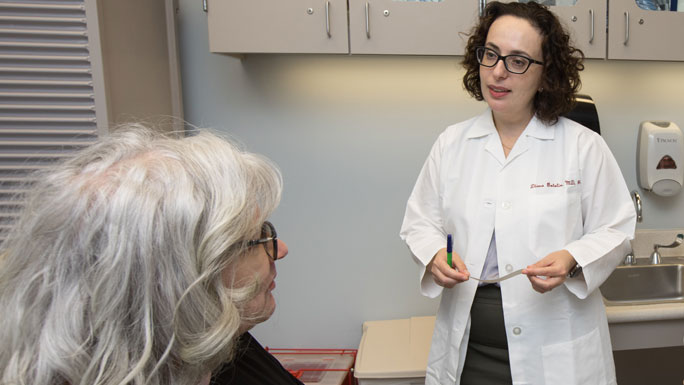Skin Cancer

If you're concerned you may have skin cancer, the University of Chicago Medicine can help. There are several different types of skin cancer, and our physicians are experts in knowing how to diagnose and treat them. Often, the key to a cure is early detection. UChicago Medicine dermatologists offer the latest diagnostic tools to identify melanoma and nonmelanoma skin cancers. We also offer mole mapping, a noninvasive method to detect melanoma using digital photography to track changes in moles.
When facing skin cancer, patients need education as well as responsive care. Our skilled and attentive specialists offer this kind of assistance. This includes helping patients understand the biology of the disease, the therapy they will receive and how to manage any side effects.
Types & Symptoms
The three most common types of skin cancer are basal cell carcinoma, squamous cell carcinoma (both are often grouped in nonmelanoma skin cancers) and melanoma.
Because skin cancers are caused by the uncontrolled growth of skin cells, the first presentation is usually a visible change in a person's skin. Consult a trained physician immediately if you observe any of these warning signs associated with common skin cancers.
Basal cell carcinoma (BCC) is the most common type of skin cancer and is usually found on sun-exposed areas of the skin, such as the face, scalp, ears, arms and torso. It rarely spreads to other parts of the body, but can be locally destructive.
Signs of basal cell carcinoma are:
- A shiny nodule or pimple
- A sore that won’t heal
- A scar-like area or rough red patches
Squamous cell carcinoma (SCC) is the second most common type of skin cancer. It begins in the uppermost layers of the skin and is most commonly a result of lifelong sun exposure. A small percentage of SCCs have the potential to spread to other areas of the body.
Signs of squamous cell carcinoma are:
- Crusted red nodules (typically on sun-exposed skin but can also occur inside the mouth or the genitalia)
Melanoma develops in the cells that make pigment in the skin. It is the most serious type of skin cancer and the most common form of cancer for adults between 25-29 years old. It can spread quickly through lymph nodes to the internal organs, but when diagnosed and treated early, has a high cure rate.
Signs of melanoma are:
- A growing mole that changes shape, color or size
- A mole that bleeds or is painful
- A new “mole” that grows rapidly
- A dark streak or black discoloration of the fingernail
Risk & Prevention
The incidence of skin cancer has been increasing quickly for the past few years. One in two men and one in three women will develop nonmelanoma skin cancer in their lifetime. Once a patient has a nonmelanoma skin cancer, there is a much higher risk of developing more skin cancers.
The risks factors for developing nonmelanoma skin cancer include:
- Exposure to arsenic
- Fair skin
- Heavy UV exposure
- History of radiation therapy
- Immunosuppression
- Indoor tanning bed use
- Multiple blistering sunburns
- Northern European ancestry
- Prior skin cancer diagnosis
- Some forms of the HPV virus
Individuals at higher risk of melanoma include those with:
- Red or blonde hair
- Blue or green eyes
- Many atypical moles
- A first-degree relative with a history of melanoma
- A previous diagnosis of melanoma or non-melanoma skin cancer(s)
Sun exposure can damage your skin during any season, but summer rays are more harmful and can raise the risk of developing skin cancer.
Tips for smart sun care include:
- Use sunscreen daily. Look for a "broad spectrum" sunscreen that protects against both UVB light and UVA rays.
- Opt for water-resistant products with a sun protection factor (SPF) of at least 30 on an average day, whether bright or cloudy. Choose a higher SPF for outdoor activities, especially swimming and exercise.
- Apply sunscreen liberally and reapply at least every two hours and after swimming or sweating.
- Wear sunglasses, use SPF 15-30 lip balm and reapply often.
- Wear sun-protective clothing.
- Minimize sun exposure between 10 a.m. and 4 p.m. Seek shade.
- Avoid tanning bed use.
- See your dermatologist for a yearly skin exam.
Treatment Options
Nonmelanoma skin cancers are some of the most treatable cancers. When melanoma is caught and treated early (before it spreads to the lymph nodes), it is also highly curable. The goal of treatment for skin cancer is to remove, or excise, all of the cancer. Typically, the first line therapies are surgical.
Non-surgical treatments may be an option in some cases. Radiation, chemotherapy or immunotherapy may be necessary for advanced cases of skin cancer or when patients are unable to have surgery. Learn more about treatment for melanoma skin cancers.
The type of surgical treatment used depends on the type, size, depth and location of the tumor. In most cases, the procedure is done on an outpatient basis. The most common surgical procedures to remove cancerous areas of the skin are:
During this procedure, a specially trained surgeon removes thin layers of skin in stages and examines them under a microscope for the presence of cancer cells. The process is repeated until no cancer cells remain. Mohs is used for certain types of skin cancer on the head, neck, feet and genitalia. It offers the highest cure rates (up to 99 percent for certain skin cancers) and leads to the best possible cosmetic result.
The resource listed below provides additional information about Mohs Micrographic Surgery:
- https://www.skincancermohssurgery.org/
The University of Chicago Medicine provides links to other organizations as a service to our site visitors. We are not responsible for information or services provided on other websites.
During this procedure, the skin cancer is excised along with a standard amount of normal-appearing skin. This may be used for melanoma and small nonmelanoma skin cancers on the torso and extremities.
This procedure involves scraping the cancerous growth with a curette and cauterizing the area to destroy residual tumor and to control bleeding. This may be effective for a subtype of basal cell carcinoma and very early squamous cell carcinoma.
Convenient Locations for Skin Cancer Care

Cancer Care Second Opinions
Request a second opinion from UChicago Medicine experts in skin cancer care.


How Can We Help?
Useful Resources for Patients & Visitors
